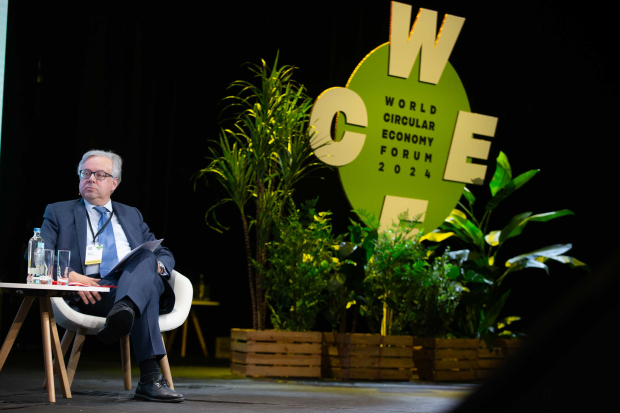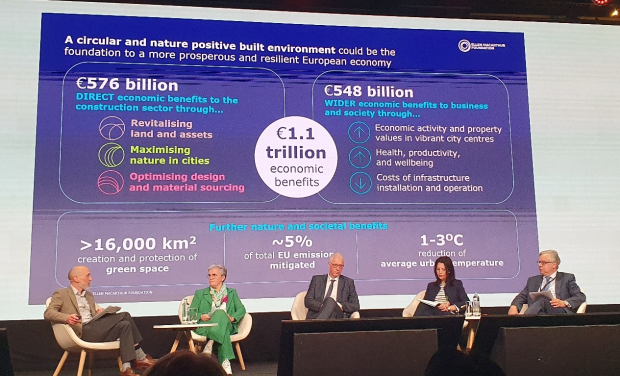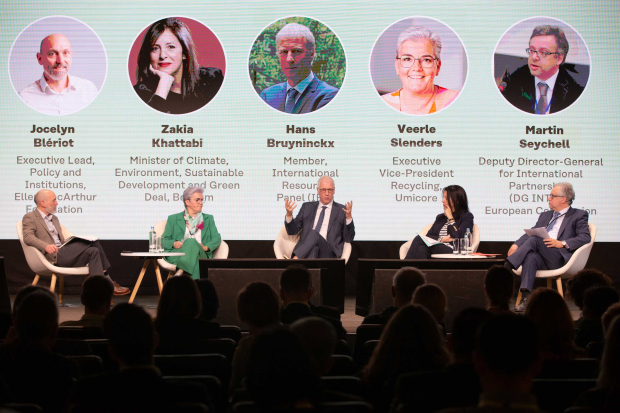A secret recipe for transformation and a proven circular business model: Take aways from #WCEF2024 panel discussion
Discussion details
At #WCEF2024, Martin Seychell, Deputy Director General, Directorate-General for International Partnerships was part of a panel discussing what kind of policies are needed to manage the circular economy transition, and how companies see the regulatory changes ahead. In the session 'European and global perspectives on policy, investment and innovation', he explained the EU's role in in driving circular policies and investments.

With increasing global demand for natural resources, the transition to a circular economy requires predictable and coherent regional and global policies which trigger innovation and investment. Martin Seychell, Deputy Director General, Directorate-General for International Partnerships, stressed the need to step up the implementation of circular economy policies and initiatives. He highlighted that the implementation of the EU Circulary Economy Action Plan has a strong international dimension. He stated that the EU works at three levels: global, regional,and national. At the global level, the EU supports initiatives like the Partnership for Action on the Green Economy and the Global Alliance on the Circular Economy and Resource Efficiency and is involved in negotiations on a globally legally binding agreement to end plastic pollution. The EU also engages at the regional level with circular economy alliances in Africa, Latin America, and the Caribbean. The EU's global gateway strategy recognizes the need for access to finance and the involvement of the private sector for transitions to happen. He underlined that the EU works closely with European financial institutions like the EIB to make sure private sector investments in sustainable sectors can be made. At the national level, the EU provides technical and financial assistance, engages in policy dialogues, and fosters external investments in countries to promote circular economy transitions. In 20203 alone, over 100 countries have benefited from EU support to promote a circular transition of their economies, Martin Seychell summarised.
Rising trends in global resource continued
Experts from the Ellen MacArthur Foundation and the International Resource Panel set the scene for the WCEF2024 session. Hans Bruyninckx, Lead Author of the International Resource Panel (IRP), underlined the need for a transition to a circular economy as rising trends in global resource use have continued or accelerated as documented in the recently launched Global Resources Outlook. The report outlines the necessary steps to create a sustainable economy for 10 billion people within planetary boundaries. The authors suggest circularity and more sustainable and resource-smart ways of provisioning basic services that deliver results by 2060, including material use in the European market and abroad could fall by 30% while greenhouse gas emissions could be reduced by more than 80%. The report emphasises the importance of strong governance systems, the alignment of the financial system with the global economy's shift towards sustainability, and the need to address inequality to achieve a circular economy.

Jocelyn Blériot, Executive Lead, Policy and Institutions Ellen MacArthur Foundation, highlighted the importance of addressing the root causes of global issues, such as unsustainable material consumption. He presented results from an upcoming report of the Foundation that identifies built environment as the main drivers of material impacts. The upcoming report forecasts €1.1 billion economic benefits created by a circular and nature positive built environment.
Zakia Khattabi, Belgium Minister of Climate, Environment, Sustainable Development and Green Deal acknowledged the pressing global issues of climate change, biodiversity loss, pollution, food crisis, poverty, and wars, and the need to address the root causes. She called for reflections on the next steps to scale up and accelerate the circular transition under the European Green Deal. She raised questions about the consistency of resource policy, the role of sustainable resource management, and the instruments in place to significantly decouple resource consumption from environmental impact.
A proven circular business model
Veerle Slenders, Executive Vice-President for Recycling at Umicore provided the private sector perspective to the debate. As a global materials technology and recycling enterprise, Umicore has developed a proven business model for circularity. She said: “You need funding to do right investments and innovation, you also need policies and frameworks that give us security about what is going to happen.”
The secret recipe for transformation
Martin Seychell underlined the importance of a holistic approach for a successful circular economy transition, as neglecting one aspect of the transition could slow down the whole process. He called for horizontal approaches across policy areas to maximise synergies between policies, rather than focusing on one policy at a time. As an example, he said - circularity in products cannot be an afterthought, it needs to be embedded in the design of products. But a transition cannot stop there, it needs to consider circular business models and circular value chains. He concluded the session by reiterating the need for implementation. “We need to be even more determined," he said.

Log in with your EU Login account to post or comment on the platform.